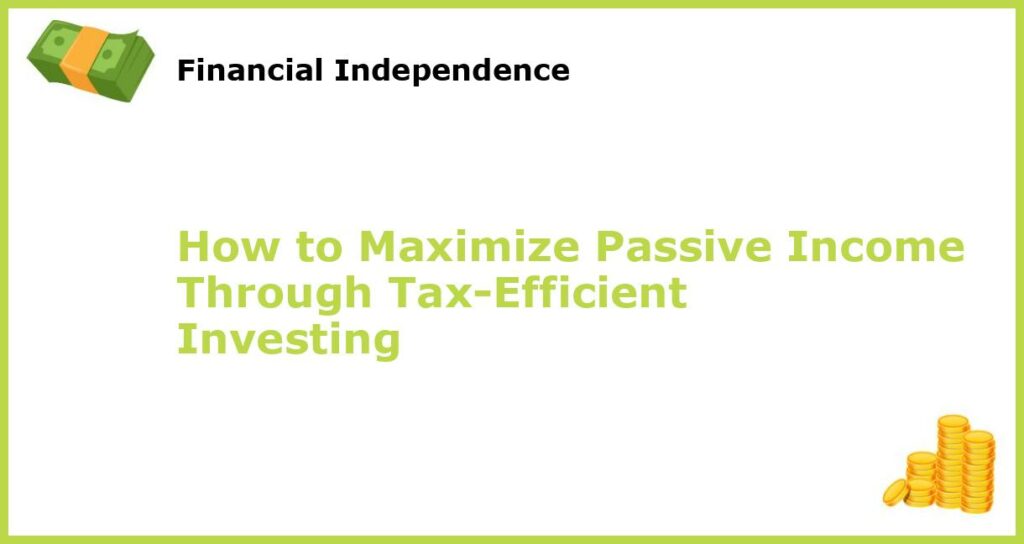Investing is a great way to generate passive income and achieve long-term financial stability. However, to maximize your passive income, it’s important to employ tax-efficient investing strategies. In this article, we’ll discuss ten ways to maximize your passive income through tax-efficient investing.
Understand the Different Types of Tax-Efficient Accounts

One of the first steps in maximizing passive income through tax-efficient investing is to understand the different types of accounts available to you. For example, a traditional IRA allows you to deduct contributions from your taxable income, potentially reducing your tax liability. On the other hand, a Roth IRA allows you to withdraw funds tax-free in retirement. A 401(k) is an employer-sponsored retirement plan that also allows for tax-deferred growth. A Health Savings Account (HSA) is a tax-advantaged account that allows you to save for healthcare expenses. It’s essential to choose the account(s) that align with your financial goals and tax situation.
Invest in Tax-Deferred and Tax-Free Assets

Another way to maximize passive income is to invest in tax-deferred or tax-free assets. For example, municipal bonds may be exempt from federal taxes, making them an excellent choice for tax-efficient investing. Additionally, investing in a Roth IRA allows you to achieve tax-free growth on your investments. By investing in assets that offer tax advantages, you can keep more of your passive income and potentially achieve higher returns over time.
Rebalance Your Portfolio Regularly

Rebalancing your portfolio regularly can be an effective way to maximize passive income through tax-efficient investing. For instance, if a particular asset class becomes over-weighted in your portfolio, it could trigger unwanted tax consequences. By adjusting your portfolio periodically to align with your investment goals and overall financial situation, you can strategically minimize taxes and maximize your returns.
Minimize Taxes on Dividends and Capital Gains

Dividends and capital gains can be a massive source of passive income for investors. To maximize your returns, it’s crucial to minimize the taxes on these types of income. Holding assets for at least one year is one way to reduce tax rates on long-term capital gains. Additionally, investing in funds that focus on tax-efficient dividend and capital gain strategies can help minimize your tax liability.
Diversify Your Investments

Diversification is a key component of any successful investment strategy, and it’s no different when it comes to tax-efficient investing. By spreading your investments across different asset classes and sectors, you can reduce your overall tax liability and increase the likelihood of achieving long-term financial success. Investing in assets in various accounts can help balance your tax liability.
Use Tax-Loss Harvesting

Tax-loss harvesting is a tax-efficient investment strategy that involves selling securities that have declined in value to offset the gains from other investments. This strategy can also be used to reduce the tax liability in portfolio rebalancing. This can be a great way to minimize your tax liability and maximize your passive income over time.
Consider Tax-Efficient Mutual Funds and ETFs

Investing in tax-efficient mutual funds and ETFs can be a smart way to maximize your passive income. These types of funds are designed to minimize taxes on dividends, capital gains, and other types of income. By choosing the right funds, you can enhance your returns and minimize your tax liability. However, be sure to do your due diligence on these types of funds; they may have other hidden costs.
Be Mindful of Capital Gains Distributions

Capital gains distributions can occur when your funds assess capital gain to an investment in the fund, boosting the funds revnue through distribution to investors. To maximize your passive income, it’s important to be aware of these distributions, which can occur at any time during the year. By staying aware of your investments and the potential tax consequences, you can plan ahead and avoid any negative financial impacts. There are funds that minimize capital gain distributions or you can not buy the fund at all at the end of the year.
Take Advantage of Retirement Accounts

Retirement accounts such as a 401(k) or traditional IRA can be a powerful tool for maximizing your passive income. By contributing to these accounts, you can deduct your contributions from your taxable income and potentially reduce your tax liability overall. Additionally, many retirement accounts offer tax-deferred growth and other tax advantages, making them a great option for long-term investing. As a note, any account that has tax-deferred growth means that when you withdraw the investments, you will be taxed.
Work with a Professional
Finally, working with a professional can be a smart way to maximize your passive income through tax-efficient investing. Financial advisors and tax professionals can help you navigate the complex world of tax laws and investment strategies, helping you make informed decisions and achieve your long-term financial goals. However, be sure to do your due diligence before you choose a financial professional. Determine if you both have the same views and goals before entrusting someone with your investments.







